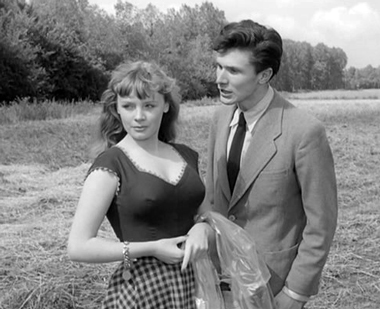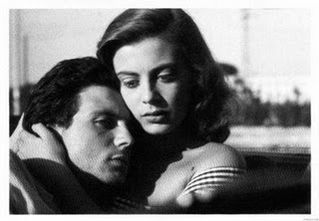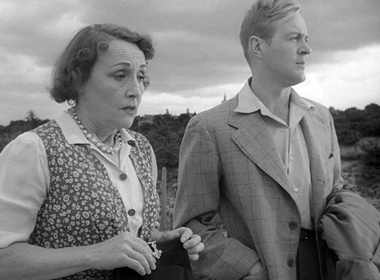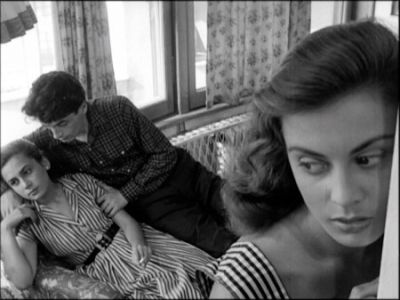
 |
|
|
|
Now that Kino Lorber is distributing the Rarovideo line of discs, we have a new Blu-ray release of one of the label's most important titles, director Michelangelo Antonioni's once-elusive Sophomore feature effort I vinti (The Vanquished) from 1953. As we soon find out, films about juvenile delinquency were just as controversial in Europe as in America. The film's dramatization of sordid crimes committed by disaffected young people caused its producers plenty of trouble -- attracting censorship and political interference in the script stage, during filming, and on the film festival circuit. Rarovideo allows us to see for ourselves what was done to make I vinti acceptable for public consumption. The extras also provide an early cut of one of the film's three episodes, before distributor second-guessing mandated reshoots. 
The trio of stories takes place in different countries. Each is an altered version of a true event. In France, a clique of delinquent high school students have conned themselves into a twisted empowerment fantasy. Pooling their resources, they fool their parents, skip out on school and head to the country for a day. Unofficial ringleader Georges feels threatened by the popular Pierre, who has achieved celebrity status in the group with ridiculous fantasies of a wealthy background and exotic lovers. Pierre carries wads of fake money to fool his friends and boasts of taking off for Algeria rather than continuing his schooling. Georges' brother André is resentful because Pierre has attracted his girlfriend Simone (Etchika Choreau), who openly states that she wants to be rich and humiliate people less fortunate than she. But Simone is putting on an act as well. The manipulative Georges has persuaded both her and André into murdering Pierre for the huge bankroll he carries, so all of them can run away to Algeria. The Italian episode, as finally released, is about college student Claudio (Franco Interlenghi of Shoeshine), the son of a wealthy insurance executive (Eduardo Ciannelli). Claudio's parents don't know that he's part of a gang smuggling cigarettes. Caught in a police raid, the young man eludes capture but kills an officer and injures himself jumping from a bridge trestle. Claudio protests to his beautiful girlfriend Marina (Anna-Maria Ferrero) that he doesn't feel guilty: he committed crimes to get money fast so he could enjoy life while he was young. He wants Marina to run away with him, but his injury is more serious than he thinks. In the English segment, a London tabloid offers to pay money for sensational stories. Unemployed poet Aubrey Helland (Peter Reynolds of Devil Girl from Mars) phones in with the news that he has found the dead body of a woman in a rural area. Reporter Ken Wharton (Patrick Barr) jumps at the bait but also calls the police. Aubrey insists on writing his own story, to be accompanied by a big picture of himself on the front page. He immediately takes his bounty to the dog track. Ken is intrigued by Aubrey's unabashed egotism but dismayed at the his lack of concern for the murder victim (Fay Compton). When the money runs out and his notoriety hasn't made him any more popular with a girl he likes, Aubrey contacts Ken once more. He'll do anything to achieve the celebrity he craves... 
I vinti is beautifully directed, with Antonioni handling his young actors with ease. Nothing seems false in any of their behaviors, and his use of the camera is exemplary. The locations in all three countries seem particularly vital. Antonioni shoots in places like Piccadilly Circus, without resorting to the usual travelogue treatment. The French episode has similarities to Frank Perry's 1969 teen shocker Last Summer. Having rejected their middle-class futures, the kids feed on their own fantasies of responsibility-free riches and opportunity, forming a social chemistry that enables a mild sociopath in the group to take control. We can see the tragedy coming, as they have decided they're responsible to nobody and have lost any sense of judgment or perspective on their acts. One girl brings her tiny sister along, yet Georges' moronic murder scheme goes on as scheduled. The femme fatale Simone revels in her job of conning the victim into writing a note that will explain his sudden disappearance. The Italian episode was originally quite different. Inspired by radical politics, Claudio dynamites a weapons factory, presumably killing or injuring a number of workers. But he's concussed by his own bomb, and can't make a proper getaway. Presenting a privileged college student acting as a Marxist terrorist made nobody happy. Conservatives objected that the film glamorized political violence, and leftist critics thought the film's condemnation of Claudio's actions was too ambiguous. This alternate original version was seen only at a film festival premiere, and its inclusion as a disc extra allows an examination of the mechanics of the reshoot and re-dub that changed Claudio into a common crook with a less-controversial motivation. We often shake our heads when the intentions of American filmmakers are censored into meaninglessness, and it's interesting to see that European greats have been frustrated by similar troubles. The English episode is the most interesting from a screenwriting point of view -- it seems a precursor to Antonioni's huge '60s hit Blow-Up, which is also about a body found in an English park. The disturbingly credible Aubrey Helland is a fascinating menace, an optimistic nobody obsessed with the idea of becoming famous. Delighted whenever receiving public attention, he tells a crowded courtroom matter-of-factly that the life of the dead woman is of no great concern to him. Aubrey would seem a meaningful character in the existential postwar world. The episode ends with a shot of tennis players, which seems innocuous until one remembers Blow-Up's finale, with its tennis match sans tennis ball. 
The movie's succession of titles display the evolution of its political content. The project began as I nostri figli (Our Sons), was changed to Prohibido ai minori (Prohibited to Minors) and then to Gioventù tradita (Betrayed Youth) before settling on I vinti. In England it was called Youth and Perversion. Although partly sponsored by a Catholic production company, the script's mix of radical politics and sordid stories of criminal youth raised eyebrows. In addition to Claudio's radical political opinions, we're told that lines of explicit dialogue about sex were cut. Influential authorities in France and Italy may have been concerned to protect their national images, as were American diplomats at this time during the Cold War. Antonioni and his chief screenwriter Suso Cecchi d'Amico are saying that conditions are breeding a generation of Leopolds & Loebs. I vinti sometimes resembles an Italian neo-realist film, but it is more of a socially conscious true crime exposé. As in Rebel without a Cause, we see that the wealth of the youths involved is irrelevant. None of the characters is destitute and all have caring parents. Claudio is well off and his girlfriend Marina is even more affluent. The English segment is probably the most successful because it dramatizes serious issues without resorting to characters expounding their beliefs on camera. Aware that his newspaper is partially responsible for encouraging a murder, the reporter is sickened to learn that other daily papers are following his profitable example. To ward off a potential moral backlash, I vinti's final version opens with a montage of newspaper coverage of juvenile discontent, delinquency and crime. The headlines are backed by a specious narration that cites the usual reasons for youth crime, adding the new existentialist philosophy to the list of causes. As they were raised in a wartime atmosphere of violence, the European youth of 1952 are called "the burnt-out generation". All of the acting (and dubbing) is good. The French kids make an interesting 'day in the country' ensemble, with Etchika Choreau (Darby's Rangers) more than enticing enough to goad some mixed-up kid into committing a violent act. Star Franco Interlenghi is excellent in the Italian segment, and the beautiful Anna-Maria Ferrero is strong in her few scenes. Peter Reynolds is fascinating as the utterly conceited Aubrey. Antonioni keeps the final English sequence in such careful balance that the actors stand out from their environment, yet always seem a part of it. The film's use of source music is interesting -- Aubrey's theme seems to be Danny Boy. The IMDB identifies actor David Farrar as making an appearance, a listing that appears to be incorrect. 
The Rarovideo / Kino Lorber Blu-ray of I vinti is pretty much identical to their DVD release of 2011, with the added contrast range and clarity of HD. Although much of the flat B&W image is in excellent condition, various scenes are taken from dupes with inconsistent contrast or what looks like processing damage. A disclaimer says that the show was reassembled from three sources. Tracks are provided in original Italian (with English subs), French and English. 
The extras begin with an insert pamphlet with an absorbing essay by Stefania Parigi. She straightens out the confusing story of the film's consistent bad luck -- French authorities allowed the negative of the France-set sequence out of the country only when Italian diplomats intervened. A video interview with co-writer-producer Turi Vasile talks about these problems as well. Vasile interestingly pegs the problem of juvenile delinquency as a "fragmentation of personality". In a separate interview, actor Franco Interlenghi can recall only a few anecdotes about the film, but has plenty of memories to share about his romances with various female stars. Also included is the short film Tentato Suicidio, Michelangelo Antonioni's segment from the multi-part feature L'amore in città. Partly narrated, it gathers seven or eight people who have attempted suicide to recount their experience. We see them in an interview situation, and they also explain their feelings while visiting the places where the attempts occurred. Staged recreations are included as well. Each story involves an unhappy romance. We're told that views of the attempted suicides carefully lined up and lit for the camera are similar to Antonioni's original opening for I vinti, before it was replaced by the newspaper montage and thematic lecture. The original 'political' version of the Italian segment is from a surviving print and contains scratches and a short patch restored from a videotape copy. Its inclusion negates several reviews I've read that presume that I vinti fits in neatly with director Antonioni's later film examinations of identity and personalities in crisis. Other critics may not be aware that the prologue that harps about a "burnt-out generation" is not Antonioni's doing. The film's misguided, essentially egotistical criminals, as originally conceived, kill for three separate reasons -- money, abstract principles and fame. The only one that may actually get away with his crime is the one that kills for money. Rarovideo's authoritative disc presentation of I vinti will delight fans wishing to learn more about the impressive early films of the Italian master.
On a scale of Excellent, Good, Fair, and Poor,
I vinti Blu-ray rates:

Reviews on the Savant main site have additional credits information and are often updated and annotated with reader input and graphics. T'was Ever Thus.
Review Staff | About DVD Talk | Newsletter Subscribe | Join DVD Talk Forum |
| ||||||||||||||||||